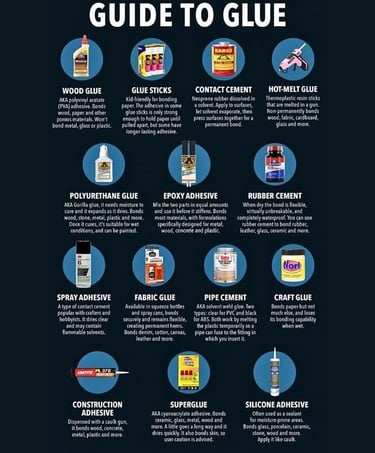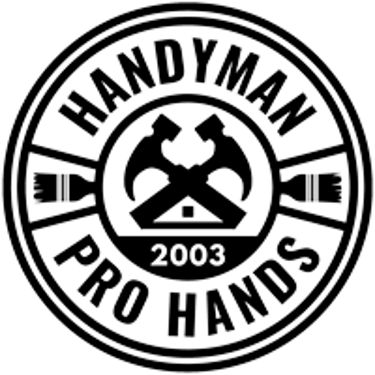The Ultimate Guide to Glue: Choosing the Right Adhesive for Your Project
When it comes to DIY projects or professional repairs, choosing the right glue is crucial for achieving long-lasting and durable results. Here is an in-depth guide to various types of glue, their uses, and the materials they work best with.
ARTICLES
2/8/20252 min read


1. Wood Glue
Best For: Wood, paper, and other porous materials.
Properties: Also known as PVA (polyvinyl acetate) adhesive, it creates a strong bond but is unsuitable for metal, glass, or plastic. It dries clear and is sandable, making it ideal for woodworking projects.
Tips: Apply evenly and clamp the pieces together for a firm bond.
2. Glue Sticks
Best For: Paper, lightweight crafts.
Properties: Perfect for school projects and paper crafts, glue sticks provide a quick-drying bond. Some versions offer longer-lasting adhesion.
Tips: Use for temporary fixes or projects requiring minimal strength.
3. Contact Cement
Best For: Leather, rubber, metal, glass, and some plastics.
Properties: Neoprene-based adhesive applied to both surfaces for a strong bond. Works well for permanent fixes.
Tips: Allow the adhesive to dry to a tacky consistency before pressing the surfaces together.
4. Hot-Melt Glue
Best For: Wood, fabric, cardboard, plastics.
Properties: Thermoplastic resin adhesive that is melted in a glue gun. It sets quickly and forms a durable bond.
Tips: Use caution when handling as it can cause burns. Perfect for crafts and quick fixes.
5. Polyurethane Glue
Best For: Wood, metal, plastic, and concrete.
Properties: Expands as it dries, forming a waterproof and extremely strong bond. Can be sanded and painted once cured.
Tips: Moisten one surface before application to activate the curing process.
6. Epoxy Adhesive
Best For: Metal, wood, concrete, plastic, and more.
Properties: Consists of two parts (resin and hardener). Provides a high-strength, durable bond.
Tips: Mix equal parts of resin and hardener thoroughly before use. Allow sufficient curing time.
7. Rubber Cement
Best For: Paper, fabric, and rubber.
Properties: Dries flexible and can be easily peeled off if needed. Ideal for temporary or repositionable bonds.
Tips: Apply thin layers for a cleaner finish.
8. Spray Adhesive
Best For: Paper, fabric, cardboard, and foam.
Properties: Creates a uniform, permanent bond. Dries clear and is often used in crafting and design.
Tips: Spray evenly from a distance of 6-8 inches.
9. Fabric Glue
Best For: Denim, cotton, leather, and other fabrics.
Properties: Flexible and washable once dried. Ideal for fabric repairs and decorative crafts.
Tips: Allow to dry fully before wearing or washing.
10. Pipe Cement
Best For: PVC and ABS pipes.
Properties: Specialized for plumbing applications. Creates a chemical bond for leak-proof seals.
Tips: Clean the surfaces thoroughly before application for the best results.
11. Craft Glue
Best For: Paper, light crafts.
Properties: Versatile and easy to use, but not water-resistant.
Tips: Use for low-strength projects like scrapbooking.
12. Construction Adhesive
Best For: Wood, concrete, plastic, and metal.
Properties: Comes in caulking tubes for easy application. Ideal for heavy-duty construction projects.
Tips: Apply in a zigzag pattern for maximum adhesion.
13. Super Glue
Best For: Ceramic, metal, glass, and small repairs.
Properties: Bonds quickly and works best on non-porous surfaces. Use sparingly.
Tips: Avoid contact with skin and eyes. Keep surfaces clean and dry.
14. Silicone Adhesive
Best For: Glass, porcelain, and plastics.
Properties: Resistant to water and temperature extremes. Often used as a sealant.
Tips: Apply with precision and smooth the surface with a damp tool for a neat finish.
Final Thoughts Choosing the right adhesive can make or break your project. Always consider the materials you’re working with and the conditions the bond will endure. Need help with repairs or DIY projects? ProHands Handymanis here for you!
📞 Contact us today at 818-401-7766 to learn more or get assistance with your next project!
